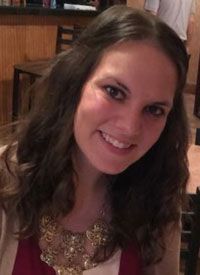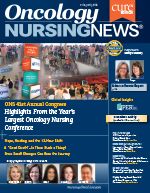How Even Small Changes Can Ease a Patient's Journey
Change is the one word that describes an immediate result of a cancer diagnosis. A patient’s world can be turned upside down, and they could end up facing obstacles including dietary changes, role changes within their family, and even changes in their activities of daily living.
Megan Whittington

Megan Whittington
Change is the one word that describes an immediate result of a cancer diagnosis. A patient’s world can be turned upside down, and they could end up facing obstacles including dietary changes, role changes within their family, and even changes in their activities of daily living. They have to think about and plan for the effect of the diagnosis on every aspect of their lives. Certain tasks that once were routine can become obstacles, creating even more stress.
As a lay navigator, I have found that one of the greatest joys I have been able to experience has been when I find and offer a patient a resource which not only works for them, but gives them an emotional boost that can make all of the difference when facing what is often an overwhelming disease. The turnaround in a patient’s attitude and emotional state not only brightens their day, but also reminds me of why I am so passionate about helping patients overcome barriers. It’s inspiring to see how offering resource assistance can make a huge impact on the patients—not only emotionally, but often physically as well. Sometimes resolving the barrier can be a game changer when I am able to assist them with access to care or ease of receiving their treatment.
One patient that comes to mind is Patricia. Patricia was at an all-time low when she was first referred to me. She had recently been diagnosed with colon cancer, and it not only was affecting her emotional state, as she had to relay the news to her daughter and church family, but also was affecting her day-to-day life. Transportation, finances, getting groceries, housework, and fear of “overwhelming” her friends and family were only some of the struggles she expressed to me when I began working with her. As I was going through resource options to help Patricia, I heard her anxiety, and I was determined to help in identifying resources which might assist in decreasing some of the distress that she was experiencing.
I knew that the task would be challenging. Some of the hurdles we face in helping patients can include extensive resource investigations and evaluation, hoping a particular grant continues to have available funding, and even dealing with insurance companies. Patricia’s barriers were not resolved overnight, but with assistance from her medical oncologist office social worker, I helped Patricia apply for resources to assist in resolving some of the financial and transportation barriers she was now facing. Patricia was very grateful for this assistance, but I knew that housework and her lack of energy were still a huge burden for her as she had begun treatment for her colon cancer.
Patient’s “Game-Changer”: Housework
The “game changer” for this patient was her barrier with housework. Patricia explained how important having a clean house was for her. She explained to me that when her house was dirty, she simply could not relax. She related that she was out of energy after her chemotherapy and simply could not do her day-to-day tasks which increased her anxiety and stress. She also stated that she did not want her friends from church to come by anymore, as she was too embarrassed to open her home to anyone, and that this was taking a toll on her lifestyle.
I contacted a housecleaning resource who arranged for free services for Patricia. After the first time her house was cleaned by the service, her attitude changed drastically. She seemed happier, uplifted, and told me, “I hit the jackpot!” after having her home cleaned the first time. She described it to me as a blessing out of the blue, and stated that it was the energy boost that she needed. She related that the cleaning company not only made her house “spotless” but also gave her a gift of an aromatherapy candle. She said that she will never light it, as it is her keepsake to remind her of the gift and the effect it had on her.
Feeling Like Herself Again
Another example involved a patient named Mary who was diagnosed with breast cancer and anxiously going through physical changes as she began her chemotherapy treatments. When I first spoke with her, she explained that she didn’t even recognize who was staring back at her in the mirror due to the amount of hair she was losing, and that it was hard for her to leave the house without the whole world knowing that she was sick with cancer. She began to neglect her supportive friends and stopped going to social gatherings, as she “didn’t want to draw attention or sympathy to herself.” I worked with her on options and different programs that would help her gain confidence in her appearance, but her overall concern was financing a wig or head scarf. We went through several different resources, but she was still struggling in finding “the” head coverings that made her look and feel like herself again.
Finally, after much research, I found a resource that assisted breast cancer patients with free headscarves as long as they met certain qualifications. Mary really liked this alternative to a wig, and stated that it would even be warmer for her as she underwent her chemo appointments, as she was also on blood thinners and got cold easily. She was able to choose her favorite type, style, and color. She stated that she finally had control over something in her life again and was happier with herself. Although this was not a wig like she was hoping to find, this relatively simple solution caused a huge turnaround in her emotional state. She began to visit with her friends again and was able to resume her day to day activities again.
Patricia’s “boost” that she received from the free housecleaning resource, as well as Mary’s turnaround in control of her appearance not only lifted their spirits, but also served as an inspiration to me in my role as a navigator. Seeing these patients’ changes showed me that the navigator’s role is an important one for patients with cancer. Providing extra help and finding resources out to patients and their caregivers allows us to not only support, but also to empower, patients throughout their cancer journey.
Megan Whittington is Cancer Care Liaison at Northside Hospital Cancer Institute in Atlanta, Georgia.



